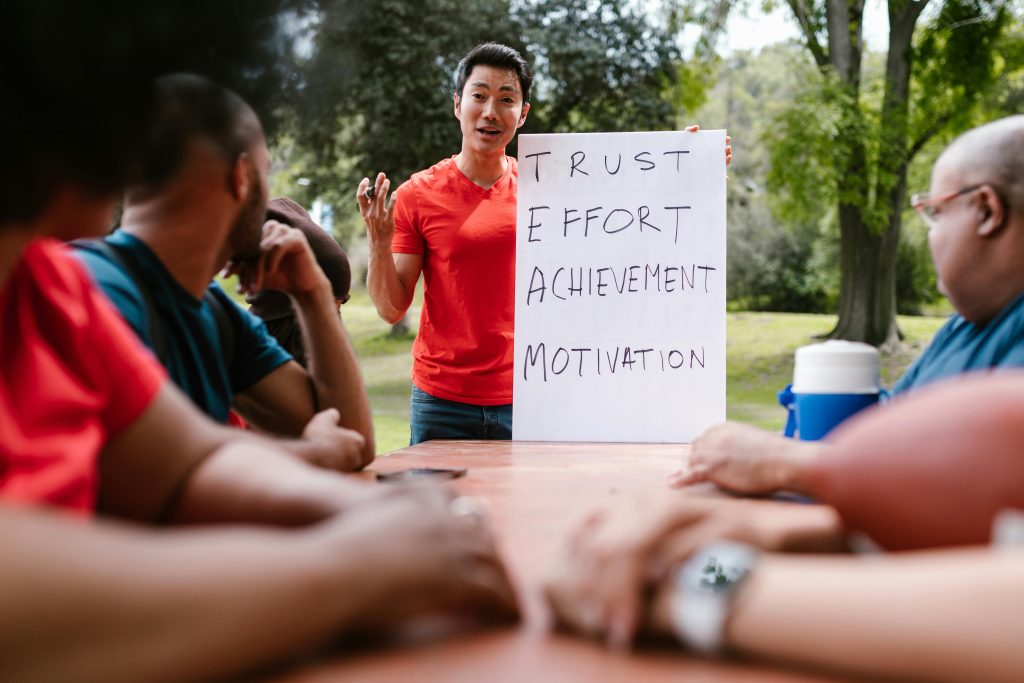Today I want to challenge the way you think about some ideas and principles we often take for granted—the very foundations that shape how we lead, connect, and inspire. Because if you want uncommon results, you have to break with the common understanding that most people have about these critical elements of leadership.
Active Trust: The Cornerstone of EPIC Leadership
The first of these is Trust. Trust is not just a virtue; it’s not a passive thing – it’s the engine that powers all elite teams. Special Operations teams simply cannot operate effectively without Active or Fierce trust. Green Berets operate in the most unforgiving environments, where every decision could have life-and-death consequences. The same applies in business: without trust, even the most skilled team will crumble under pressure. But trust doesn’t happen by accident. It’s deliberately built, fiercely protected, and relentlessly nurtured.
What is Trust in Leadership?
Trust in elite teams is active, deliberate, and built through consistent effort. Chapter 1 of The Green Beret Way: Leading Elite Teams in Extreme Conditions frames trust as the foundation for extraordinary performance. It’s more than belief in someone’s ability—it’s faith in their character, integrity, and commitment to shared goals.
We’re not talking about everyday trust – the “I trust that Jim won’t eat my lunch when I put it in the fridge.” We’re talking about Active (or Fierce) Trust—a dynamic process that starts with leadership but extends to every member of the team. This trust is built on the 4 C’s: Character, Communication, Consideration, and Coaching. Let’s explore these elements, why they matter, and how they apply in real-world leadership.
1. Communication
The next common concept I want to challenge your understanding of is “communication.” Everyone constantly talks about the importance of good communication, but what does that really mean? Is it keeping your boss informed of every little thing? Is it cc’ing every detail of a project to everyone who’s working on the project? Is it having four meetings a day to ensure everyone is “up to speed” on everything?
People have a hard time defining “good communication” despite frequently talking about how important it is.
That’s because true communication is more than just an action. It’s not just a skill. Real communication is about your values: it is an authentic expression of your Generosity of Spirit – of your Consideration and your Character.
Communication is such an important topic that I devote an entire chapter to it in my book The Green Beret Way, Leading Elite Teams in Extreme Circumstances and I have a separate seminar just on the mechanics of how to do it correctly, but for now, I want you to start thinking differently about what good or real communication actually is.
2. Character
But improving communication skills is a perfect example of why we need to address our character before training specific skills. Why? It’s hard to communicate well – sometimes overwhelmingly so. The skills required aren’t especially difficult – but actually executing the task is hard. We won’t become expert communicators until we address our character because we won’t have enough courage and self-confidence to be “generous in spirit” or be considerate enough for real knowledge sharing. In other words, we must build our own foundation and ensure it is rock solid before we can begin to be strong and support others – and ultimately, that’s what good communication is all about — carrying the full weight and responsibility of every exchange (if necessary).
Character is another concept I’m going to challenge your understanding of. We generally think of integrity as being virtuous – it’s not. It’s about consistency. Character is such an important part of trust because as a leader who you are matters more than what you know. The best leaders can be moved from department to department without having the specialized skills or knowledge that the team members have. It is much easier to learn specific skills or gain departmental knowledge than it is to become a great leader.
And it’s not just about the what – it’s also about the “who.”
They say that in business it’s all about what you know. But it doesn’t matter who you know until they know who you are. It doesn’t matter if I’ve met Elon Musk – he’s not going to recommend me to someone else until he knows what kind of person I am. Sure he might make an introduction, but he won’t recommend me or work with me until he knows he can trust that I’ll consistently act in a specific way – a way that he thinks is honest. This is what the idea of “honor among thieves” means. You can be a pickpocket with integrity if you follow the thieves code.
And that’s what integrity is really all about. Integrity is ultimately about consistency – to your personal values, and to particular company, country, or cultural ethics and norms. Integrity doesn’t mean you’re a good person – it means that you mean what you say and that your words match your actions. Ethics change from company to company and country to country, it’s your consistency that matters in espousing whatever values and ethics you claim to follow.
Integrity is really a state of being that is essential for exceptional performance. If your house collapses, it’s because it’s lost its “structural integrity;” its strength comes from what you can’t see – not the beautiful exterior.
The more broken, tainted, or compromised something is, the less potential it has to operate at its fullest capability – steel beams or humans.
That’s enough cognitive dissonance for one day. But truly think about the way I’ve redefined the concepts above and if you apply this new understanding, you’ll see almost immediate results. Next time we’ll break your brain when it comes to thinking about Consideration and Coaching.




